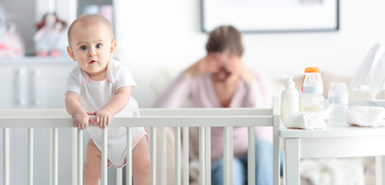
The neonatal intensive care unit, typically referred to as the NICU, is for babies who need extra care after birth.
Most hospitals don’t have an NICU, but these hospitals are still typically connected to a larger hospital that does have one, so a baby can be transferred there if needed.
I’m familiar with having a baby in NICU because it happened to our family quite a few years ago.
Our second child, a daughter, had to be transferred from my local hospital, Spectrum Health Gerber Memorial, to the NICU at Spectrum Health Helen DeVos Children’s Hospital.
She weighed just 4 pounds, 1 ounce when she came into this world at the 32-week mark. That made her a preemie, so she had to be sent there.
It had been difficult to watch her leave, but I knew she needed to go.
She left our hospital as “Baby Girl Kauffman” because we hadn’t even settled on a name for certain! (We usually narrowed it down to two names for each sex, since we never found out the gender before birth.)
That night, my husband and a close family friend went down to see her. I stayed in the hospital, although I got a chance to see her for a while the next day.
She had to stay there for three weeks. The time apart was hard. In addition to recovering from delivery, I also had a 15-month-old son.
I wanted to spend time at the NICU with our new daughter. I made many phone calls to check on her and I talked often to the nurse or doctor. After the three weeks, she finally got to come home.
It was an exciting day.
Since then, of course, there have been many amazing medical and technological advancements for babies in the NICU. Moms and families have also benefited from these changes.
One fairly recent advancement at Spectrum Health is the use of the Spectrum Health app.
The Spectrum Health app allows new parents to see their baby via video connection in the NICU, providing them visual assurance on how things are going. The technology allows a new mom to see her baby and discuss the child’s care with the neonatologist from her remote hospital room.
Making scents
While high-tech gadgets are opening new horizons in patient care, low-tech methods can still get results.
Hospitals sometimes use one interesting low-tech option to connect mom and baby: a scent cloth. These are fabric squares that absorb the smell of mom. They can also be given to mom, from baby.
What are they for? We already know that babies have a very impressive sense of smell. At birth the new baby is drawn to mom by the smell of milk (colostrum). Baby is also used to the smell of mom through the amniotic fluid while in utero.
There are plenty of great reasons to use a scent cloth. It:
- Allows mom’s smell to comfort baby when she can’t be near
- Soothes an upset or crying baby
- Encourages bonding
- Helps baby develop the ability to suck
- Helps baby’s brain develop through sense of smell
Moms can also benefit. A scent cloth helps mom:
- Smell the scent of her baby
- Pump and produce more breast milk
- Decrease postpartum mood disorders, including depression. Having baby in NICU is an added issue to mom’s recovery.
To get the scent cloth ready for baby, mom will shower and place the cloth by her breasts for about 6-8 hours. Then, place the cloth in a plastic bag and take it to baby.
It can be placed by baby’s head or on the baby’s chest. Mom would want to get more scent cloths ready. Using a plastic bag for transport seals in the smell. This is encouraged throughout the NICU stay when the parents can’t be there.
An NICU nurse can keep a scent cloth next to the baby for 12-24 hours, then give it to mom after that period so that she can smell her baby.
You should always discuss any concerns you have with doctors and nurses. Here are some important things to remember:
- Wash the cloths in unscented laundry wash.
- Replace the cloth once a day, or more often if it’s dirty.
- Avoid getting breastmilk on the scent cloth.
- Avoid perfumes, scented lotions, tobacco smoke or other strong odors.
 /a>
/a>
 /a>
/a>
 /a>
/a>